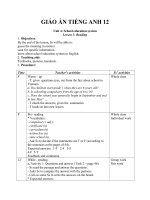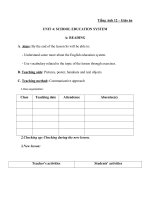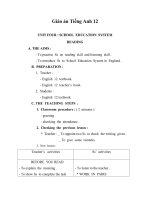bài giảng tiếng anh 12 unit 4 school education system
Bạn đang xem bản rút gọn của tài liệu. Xem và tải ngay bản đầy đủ của tài liệu tại đây (1.51 MB, 25 trang )
What kind of school is it?
It’s a kindergarten.
What kind of school is it?
It’s a high school / upper secondary school.
What kind of school is it?
It’s a primary school.
What kind of school is it?
It’s a lower secondary school / middle school.
What kind of school is it?
It’s a university.
What kind of school is it?
It’s a college.
-> They are the school education system in Vietnam.
Unit 4:
SCHOOL EDUCATION SYSTEM
A: READING
UNIT 4 : A. Reading
Năm học
. academic year (n) : School year
. parallel (adj)
: Song song
. core subject (n)
: Main subject
: Mơn học chính
. certificate (n)
: Giấy chứng nhận
. curriculum (n)
: Chương trình giảng dạy
. state school (n)
: Trường cơng lập # public school
New words:
- Compulsory /kəm'pʌlsəri/(a): bắt buộc
-
Compulsorily (adv):
Academic /ækə'demik/(a): thuộc nhà trường
Academic year: năm học
Divide into (v): Chia ra, phân ra
Fee-paying (n): đóng học phí
Curriculum (n): chương trình học
Core (a): chính, chủ yếu
Certificate (n): giấy chứng nhận
Pre – school: mẫu giáo
Primary education: giáo dục tiểu học
- Secondary education: giáo dục trung học
- GCSE (General Certificate of Secondary Education): chứng chỉ giáo
dục phổ thông trung học
Activity 1: Decide the statements about schools in Vietnam are true (T) or false (F)
1. In Vietnam children start grade 1 when they are 6 years old.
Do you think children in England start grade at the same age?
2. Schooling is compulsory from the age of 6 to 16.
F
What about in England?
3. The school year generally begins in September and ends in late
May.
Does the school year in England begin and end at the same
Time?
4. The students don’t have any examinations when they finish
secondary school.
Is it the same or different in England?
5. A school year consists of two terms.
How many terms are there in England?
T
F
T
T
Q: How many paragraphs are there in
the reading? What are they about?
- Paragraph 1: Academic year
- Paragraph 2: School system
- Paragraph 3: National curriculum
Activity 2 (Task 1,p. 46): Find out the words having
the equivalent meanings
Schools in which all children can attend without paying tuition fees
State school
2.
A stage of study for children aged from 5 to 10
Primary school
3. A stage of study for children aged from 11 to 16
Secondary school
4. Put into force by the law Compulsory
5.
The examinations children sit at the end of compulsory education
The General Certificate of Secondary Education
6.
A detailed plan for a course of study offered in a school or college
Curriculum
1.
Activity 3 (task 2, p.46): Answer questions
1.
2.
3.
4.
5.
6.
When do children in England start their compulsory education
at school?
How many terms are there in an academic year in England?
What are they?
What are the two school systems in England?
Do children have to pay fees if they go to “independent” or
“public” schools?
How many core subjects are there in the national curriculum?
What are they?
When can students take the GCSE examination?
Answer:
1.
When do children in England
start their compulsory education at school?
Children
in England start
their compulsory education at school from the age of 5.
2. How many terms are there in an academic year in England? What are
they?
There
are three terms:
Autumn term, Spring term and Summer term.
Answer:
3. What are the two school systems in England?
The
state school and the “Independent”
or “Public” school systems.
4. Do children have to pay fees if they go to “independe
“public” schools?
Yes, they are.
Answer:
5. How many core subjects are there
in the national curriculum? What are they?
There
are three core subjects:
English, Maths and Science.
6. When can students take the GCSE examination?
When
they finish the secondary school,
they can take an examination called the General
Certificate of Secondary Education.
Activity 4: Talk about the school education system in England
by answering questions below
1. - When does the academic year in England start and when
does it end? How many terms are there in a school year?
What are they? When does each of them start and finish?
2. - Name some the two parallel school systems in England.
Which one attracts more students? Why?
3. - How many core subjects are there in the national
curriculum? When can they take the GCSE examination?
Answer: 1. When does the academic year in England start and
when does it end? How many terms are there in a
school year? What are they? When does each of
them start and finish?
The academic year start in September and ends in July.
There are three terms in a school year. They are: Autumn term, Spring
term and Summer term.
Autumn term starts in September and finishes in Mid-December.
Spring term starts in January and finishes in mid-March.
Summer term starts in the early April and finishes in mid-July.
2. Name some the two parallel school systems in England.
Which one attracts more students? Why? How many
percents of students are educated in
the state school system?
The two parallel school systems in England are: the state
school and the “independent” or “public” school systems.
The state school system attract more students because they
aren’t fee – paying.
93% of students are educated in the state school system.
3. How many core subjects are there in the national
curriculum? When can they take the GCSE examinati
There are three core subjects: English, Maths and Science.
They can take the GCSE examination after finishing
secondary school.
- Translate the reading text into Vietnamese.
-Read the passage and answer questions again.
- Do task 1,2 in the notebooks.
- Prepare unit 4: Speaking.









